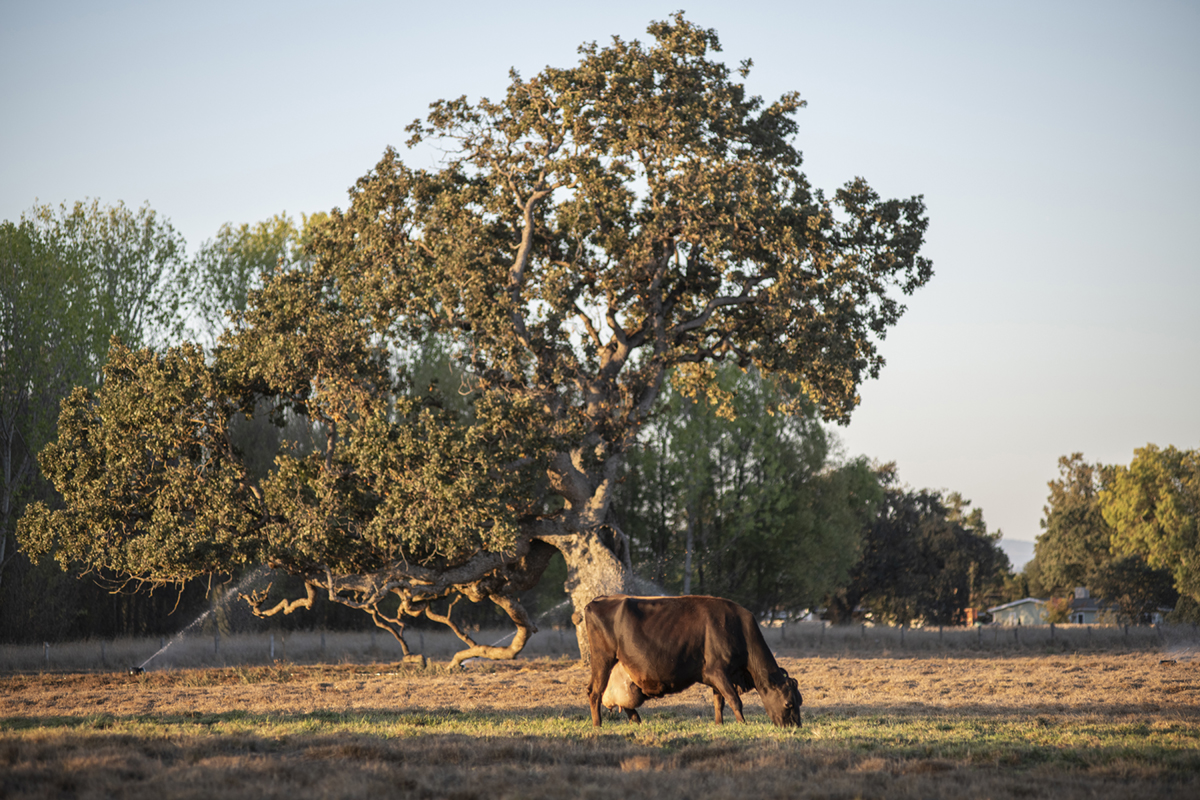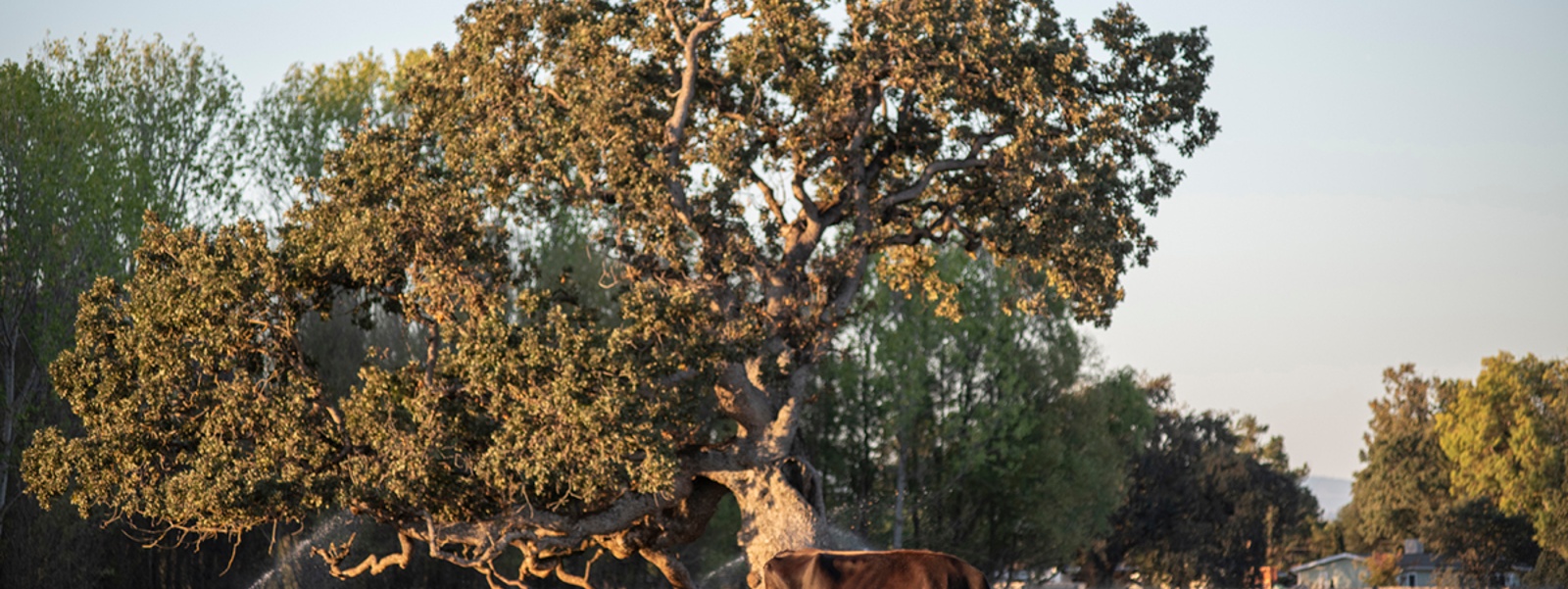Sonoma County farmers celebrate Measure J defeat

A cow grazes on open pasture at the Beretta Family Dairy in Sonoma County.
Photo/ Paolo Vescia

By Caleb Hampton
The election last week of Donald Trump as the next U.S. president and of new congressional leaders may bring sweeping—and, as yet, undetermined—changes to the nation’s agricultural landscape. But for farmers in Sonoma County, a down-ballot result has provided resounding clarity.
As of Friday, more than 85% of the county’s voters had voted against a ballot measure that within three years would have banned large dairies and poultry farms in the county. Measure J, had it passed, would have capped the number of animals each farm can raise, banning large farms or forcing them to downsize.
Doug Beretta, owner of Beretta Family Dairy in Santa Rosa and president of the Sonoma County Farm Bureau, said he was “ecstatic” so many voters had sided with the county’s farmers. The landslide result, he said, capped a 14-month effort by the No on J campaign to defeat the measure.
“The community came together to fight for agriculture,” Beretta said. “When those results came in, it really showed.”
The measure, seen by both sides as a potential catalyst of a larger movement, drew interest—and funding—from across the state and beyond. It would have made Sonoma County the first county in the nation to ban large animal farms.
No on J raised more than $1.7 million, attracting large contributions from the California Farm Bureau and other agricultural groups. The Yes on J campaign raised less money but also relied heavily on contributions from outside the county. Combined, donations topped $2 million, making Measure J one of Sonoma County’s best funded initiatives ever.
“This was their starting point,” Beretta said. “We knew if it won here, it could go throughout the state.”
Measure J specifically targeted medium and large concentrated animal feeding operations, or CAFOs, defined primarily by the number of mature animals farms have. Between 11 and 21 farms in the county could have been directly impacted, according to various estimates.
But farmers warned Measure J posed a threat to the region’s entire dairy and poultry sectors, putting at risk a farming model that has gained international acclaim for the farms’ dedication to animal welfare, climate action and environmental stewardship.
The county’s 42 organic dairies represent more than 40% of California’s organic dairies and produce 13% of the nation’s organic milk, according to the U.S. Department of Agriculture. They are supported by a local supply chain of farm service companies and creameries such as Clover Sonoma and Straus Family Creamery.
Had Measure J succeeded in shutting down several large farms, farmers said it could have undercut the economy of scale needed to support a local nucleus of feed stores, veterinarians and other services.
“Everybody is on the edge of losing the critical mass of support services,” Albert Straus, owner of Petaluma-based Straus Family Creamery, which sources milk from seven dairies in Sonoma County, said in September. “If some of the larger farms in our community are no longer able to operate, it may lead to a collapse of the entire sector.”
The Coalition to End Factory Farming, a group of environmental and animal rights organizations that supported the measure, sought to paint an image of the county’s large farms as “factory farms.” But the coalition failed to win over groups that support small farmers and sustainable agriculture—and to convince voters.
“Sonoma County is home to some of California’s best agricultural stewards,” Renata Brillinger, executive director of the California Climate and Agriculture Network, said in a statement. Nearly all the dairies that were targeted by Measure J as large CAFOs are family-owned, pasture-based farms.
During the run-up to the election, Yes on J acknowledged it was unable to form the broad alliance it wanted. It sought support from the Community Alliance with Family Farmers, or CAFF, and the Sonoma County Democratic Party, according to Kristina Garfinkel, lead organizer for the Coalition to End Factory Farming.
“We wanted this to be a collaborative thing,” she said in September at a Measure J debate held in Santa Rosa, “but we were ghosted, and we never heard anything.”
The Coalition to End Factory Farming conceded Measure J’s likely defeat in a statement released Nov. 5, expressing resolve to continue fighting.
“While the opportunity to alleviate animal suffering and move our society in a better direction fell short today, we’ve always known that this will take time, and we trust that people are going to get there,” the coalition said.
Locally, the initiative inflamed tensions. No on J signs outside Sebastopol were vandalized, while Yes on J canvassers were cursed at, according to news reports. On Oct. 21, the Sonoma County Farm Bureau received an email threatening gun violence in response to mailers the No on J campaign had sent out. The Farm Bureau locked its doors the next day.
Measure J was opposed by the Sonoma County Democratic and Republican parties, more than a dozen county Farm Bureaus, and groups representing small farmers, disadvantaged populations, climate action, environmental conservation, realtors, law enforcement, labor unions, food safety and other interests. Every city council in Sonoma County passed resolutions opposing the measure, as did the county’s board of supervisors.
A report by California State University, Chico, estimated the demise of Sonoma County’s dairy and poultry production would directly result in the loss of $259 million in economic output and 700 jobs.
A separate analysis by the University of California Cooperative Extension warned eliminating animal agriculture in the county could cause farmworkers to be displaced from their farm residences and forced out of the county due to a lack of affordable alternatives. Dairies in the county employ around 300 people and provide free housing and utilities to more than 600 workers and their family members.
“There’s so many people that trust our local products and our local brands,” Beretta said. “That’s what really brought everybody together.”
(Caleb Hampton is an assistant editor of Ag Alert. He may be contacted at champton@cfbf.com.)




